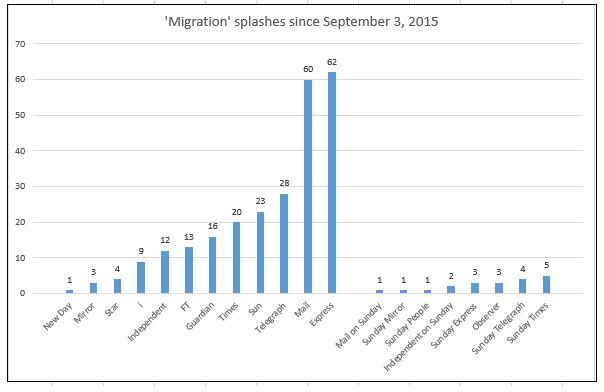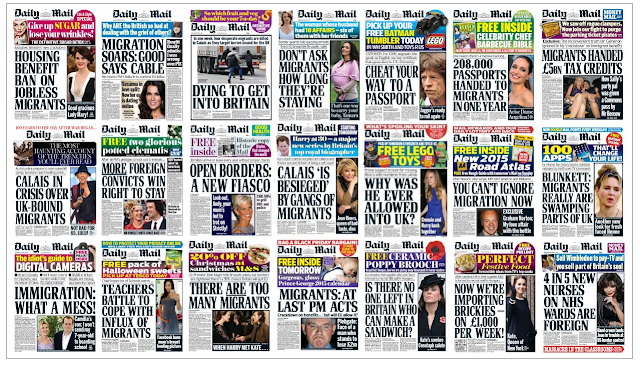Oh we do love to hate Ryanair. Low-cost airline? Pah! It’s a nasty little organisation, always looking for sneaky ways to charge customers more.
You could hear the sigh of whatever-next exasperation/outrage yesterday as the Mail brought out the “Now” word to report the company’s latest luggage policy – to revert to its old practice of allowing only one free item per passenger. “Now Ryanair charges you for hand luggage”. Note the neat use of “you”, so readers know exactly who the victim is here.
The report would certainly comply with the Editors’ Code standards of accuracy, but the tone is hostile. Passengers who turn up at the gate with two bags will have to put one in the hold, and face the “inconvenience” of having to collect it from the baggage carousel at their destination.
“Ryanair warned that anyone who refuses to put one of their carry-on bags in hold - for example because it contains valuables - will be blocked from travelling and will not be entitled to a refund.”
Classic Mail, accentuating the negative.
But it was far from alone. For The Times “Millions of passengers will be stopped from taking wheeled luggage into the cabin of Ryanair flights amid claims that the current allowances are being abused by travellers.”
See! Millions of victims, while the airline’s explanation is presented as a “claim”, ie, something to be questioned.
So, too, is its marketing chief, who is seen “insisting” all over the place that this isn’t a money-making exercise. The inference being “in the face of all the evidence”. As the Mail reminds us: “Ryanair has frequently been criticised for the extra charges it levies on customers."
So, too, is its marketing chief, who is seen “insisting” all over the place that this isn’t a money-making exercise. The inference being “in the face of all the evidence”. As the Mail reminds us: “Ryanair has frequently been criticised for the extra charges it levies on customers."
It also finds someone from an organisation called Fairer Finance to say: “This is a problem Ryanair created for themselves. By charging people a lot of money to check in bags, everybody has tried as hard as possible to avoid this. After years of treating customers with contempt, many will be suspicious of this.”
Here’s the Telegraph: “Ryanair is banning passengers from using weekend and wheelie bags as hand luggage, over claims that customers are abusing its "two items" rule and causing delays. From Nov. 1, millions of Ryanair passengers will be forced to put standard-sized hand luggage in the hold, unless they cough up £10 per return flight for priority boarding.”
There are those millions again. And now there’s a ban. And they’re being “forced” to put luggage in the hold or “cough up” ten quid. Again, all of that would probably pass muster with the Code’s accuracy clause, except there is no ban – or “bar”, as Metro puts it in its headline. You can still take those wheelie bags in the cabin if you’re prepared to pay.
Still, at least the Telegraph takes the trouble to compare baggage allowances with other airlines. The Mail, too, grudgingly admits that Easyjet allows only a single free bag and that passengers who want to take a second on board have to pay for extra legroom. Do you remember the headlines about this policy? No, nor do I. But paying for extra legroom isn’t the same is paying for priority boarding. Not least because Easyjet’s extra legroom seats cost £14.99 or £15.99.
The Express also has “ban” in its intro, and the Mirror also makes passengers “cough up” a fiver per trip, but the i, Guardian and FT all manage to tell the story accurately and straight, and the Sun hits the nail on the head with its headlines (with the toughest count of all): “Airline 2nd bag charge” and “Ryanair axe freebie”.
I travel on Ryanair a lot. There are irritations.
It is virtually impossible to change a flight because the administrative charge makes it uneconomical: it’s almost always cheaper to write off the unwanted flight and rebook.
Customer service is a nightmare: it costs a fortune to talk to a person. But the fact that it’s an English-speaking business based on the British Isles leads us to forget that Ryanair is a foreign carrier, so contacting it involves international calls. Would we be as grumpy about expensive call charges if we were trying to contact Lufthansa or SwissAir?
And those bloody scratchcards – “your chance to help children’s charities” - and the fanfare when the flight touches down on time. Spare us, please!
Oh yes, there are irritations. But I’m still a pretty satisfied customer. And on abuse of the luggage allowance, Ryanair is absolutely right.
Those suitcases on wheels are a menace. I blame Alan Sugar and The Apprentice. It’s one thing for 16 wannabe tycoons to totter/swagger across London Bridge with their bags in tow, but when it comes to thousands sauntering through the departure lounge…
It is perfectly possible to wheel such a case alongside you, but no, most trail it behind them, oblivious to the hazard it poses to people behind. It’s like a dog walker who has no idea what her pooch is doing until the lead tautens and she turns to find it having a poo or sniffing a Labrador. These cases weigh at most 10kg, what’s wrong with picking them up? It’s supposed to be carry-on, not drag-on luggage.
The diehards won't lift their bags even when they board the plane, insisting on wheeling them down the aisle. And then there’s the general kerfuffle as they’re heaved up into the lockers.
Yes, Ryanair is right about the abuse and the delays. The rule used to be one bag per person. That was eased to allow a handbag/laptop case as well – possibly in response to complaints from airport shops who presumably lost potential sales because people wouldn’t be able to take their Ted Baker or Oasis bag in addition to their wheelie case/holdall. Signs popped up all over Stansted Airport saying “All airlines, including Ryanair, now allow a second bag” as an encouragement for waiting passengers to spend, spend, spend.
Whether they did or not, I don’t know. But I do know that people started turning up at the gate not with a cabin bag and a little handbag, but with two big bags. I also know that cabin crew struggle to get people on and off the planes as speedily as they used to. For a while they have been inviting passengers to put a bag in the hold for free, but it seems too few of us have done so, so now the airline is offering a financial deterrent – and a financial incentive, although yesterday’s coverage gave that less emphasis.
The new rules
So, with interests I hope disclosed, may I attempt a straight interpretation of the new Ryanair policy.1: Passengers will be allowed to carry one bag with them without charge, as was the case until three years ago. This bag will, however, have to be smaller than it was under the previous one-bag policy.
2: Passengers will be allowed to put one bag weighing up to 10kg in the hold without charge. They will not have to check this in. They can simply drop it at the gate.
3: Passengers will be allowed to take two bags into the cabin if they pay £5 for priority boarding.
4: The check-in luggage allowance is being increased by 25% to 20kg and the charge being cut by 28% from £35 to £25. That represents a 46% price reduction in terms of kilos per £..
Case study
And here’s an attempt at a comparison of what the cost of flying to southwest France on Monday would be if the new charges were in place. The Easyjet service goes from Gatwick to Toulouse, Ryanair's from Stansted to Bergerac. Easyjet's cheapest fare for the trip is £36.49, Ryanair's £14.99.
Total cost with two carry-on bags, one checked 20kg bag, extra legroom/speedy boarding: Easyjet: £67.48; Ryanair: £54.99 (under the present regime, this combination would cost £64.99.)
With two carry-on bags, premium seat/priority boarding, no hold luggage: Easyjet: £51.48; Ryanair: £29.99 (unchanged).
With one big carry-on bag: Easyjet (without speedy boarding) : £36.99; Ryanair (including priority boarding): £19.99.
With one small carry-on bag: Easyjet: £36.99; Ryanair: £14.99
With one small carry-on bag, 10kg bag in hold: Easyjet: £52.99. Ryanair: £14.99.
There are so many permutations. But the bottom line is that Ryanair almost always offers the lowest fare for people who just want to get on a plane, land on time and get to where they want to be with minimum fuss. Michael O’Leary once said he wanted travel on his airline to be like getting on and off a bus. It’s supposed to be no-frills. That’s the business model. If you want extra bits, you can pay for them, but don’t expect everyone else to pay for them too.
Total cost with two carry-on bags, one checked 20kg bag, extra legroom/speedy boarding: Easyjet: £67.48; Ryanair: £54.99 (under the present regime, this combination would cost £64.99.)
With two carry-on bags, premium seat/priority boarding, no hold luggage: Easyjet: £51.48; Ryanair: £29.99 (unchanged).
With one big carry-on bag: Easyjet (without speedy boarding) : £36.99; Ryanair (including priority boarding): £19.99.
With one small carry-on bag: Easyjet: £36.99; Ryanair: £14.99
With one small carry-on bag, 10kg bag in hold: Easyjet: £52.99. Ryanair: £14.99.
There are so many permutations. But the bottom line is that Ryanair almost always offers the lowest fare for people who just want to get on a plane, land on time and get to where they want to be with minimum fuss. Michael O’Leary once said he wanted travel on his airline to be like getting on and off a bus. It’s supposed to be no-frills. That’s the business model. If you want extra bits, you can pay for them, but don’t expect everyone else to pay for them too.
Hence the joke about charging to use the loo. The inevitable furore followed, but it was never going to happen. The idea was to convince passengers “to go” before starting their journey, just as parents do before loading their children into the car, in the interests of efficiency and a smooth flight.
Mr O’Leary may not be everyone’s cup of tea, but – as the Times and Telegraph reports point out – millions of people use his services. In fact, it can fairly be called Europe's favourite airline, since it has the most passengers: 117m last year, against BA's 100m and Easyjet's 70m. This is, of course why the papers are so interested in everything it does - and why the Express and Mirror were wrong to treat the announcement as a business, rather than consumer, story and put it at the back of the book.
Sometimes it seems that O'Leary prefers to treasure the reputation as our least-favourite airline. Blaming your customers for the introduction of a new charge is not good PR. Ryanair doesn’t do good PR.
What would be the point when the Press has already made up its mind before a word has been uttered? After all, who would read a story that said "Chuck your bag in the hold for nothing, without having to turn up early to check it in"? Or "Ryanair slashes baggage charges by 46%"?
Mr O’Leary may not be everyone’s cup of tea, but – as the Times and Telegraph reports point out – millions of people use his services. In fact, it can fairly be called Europe's favourite airline, since it has the most passengers: 117m last year, against BA's 100m and Easyjet's 70m. This is, of course why the papers are so interested in everything it does - and why the Express and Mirror were wrong to treat the announcement as a business, rather than consumer, story and put it at the back of the book.
Sometimes it seems that O'Leary prefers to treasure the reputation as our least-favourite airline. Blaming your customers for the introduction of a new charge is not good PR. Ryanair doesn’t do good PR.
What would be the point when the Press has already made up its mind before a word has been uttered? After all, who would read a story that said "Chuck your bag in the hold for nothing, without having to turn up early to check it in"? Or "Ryanair slashes baggage charges by 46%"?
As another Irishman from way back would say: it's the way they tell 'em.





































































